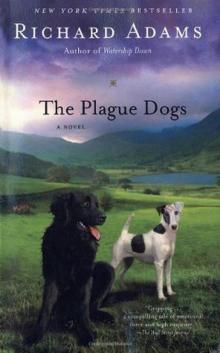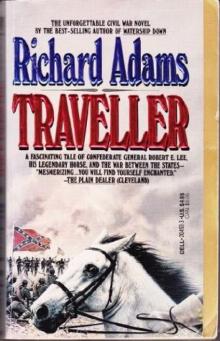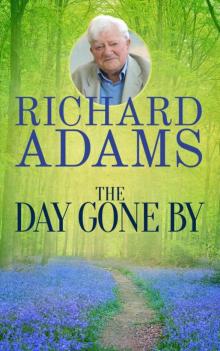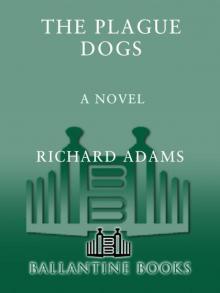- Home
- Richard Adams
The Day Gone By Page 41
The Day Gone By Read online
Page 41
Meanwhile, what had been happening to Paddy Kavanagh and Sergeant McDowell, to Jack Cranmer-Byng, to Captain Gell (commanding our third parachute platoon), and to my three sections of glider-borne jeeps? By Friday we at least knew how desperate the general situation was, for on the Thursday night two senior officers of 1st Airborne, Lt.-Col. MacKenzie and Lt.-Col. Myers, acting on General Urquhart’s orders, had escaped from north of the Neder Rijn and reported to the headquarters of XXX Corps details of what was happening at Oosterbeek.
Today everybody knows, of course, the essential story: how the division’s first lift dropped on that fine Sunday afternoon, 17 September, and set off the eight miles eastward for the bridge: how Colonel John Frost, with a good proportion of 2nd Parachute Battalion, reached it, together with Major Freddie Gough, commanding the Reconnaissance Squadron. With them were a few divisional troops; some Sappers, some Gunners and our Captain Gell’s parachute platoon. David Clark was there, too. The rest of the division were prevented by the Germans from getting into Arnhem, and after very heavy losses on the afternoon of Tuesday, 19 September, were forced into a defensive perimeter, about a mile in diameter, most vulnerably based on Divisional Headquarters in the Hartenstein hotel at Oosterbeek, about a mile or so west of Arnhem. The southern end of the perimeter rested on the north bank of the Neder Rijn, and here there was a ferry of sorts. This was why it was considered worth hanging on. As explained, by Wednesday evening the Nijmegen crossing was in Allied hands, and it was still expected that the 2nd Army would reach the south bank of the Neder Rijn in force, take the ferry and relieve 1st Airborne.
During the week the eastern and western sides of the Oosterbeek perimeter were gradually squeezed closer together. By Sunday 24 September, they were only about half a mile apart, and full of holes at that. The Germans were prevented from cutting off the division’s precarious hold on some 600 yards of the north bank, to the east by a scratch force under the famous Major Dickie Lonsdale, one of the heroes of Arnhem, and to the west by what was left of the Border Regiment, who suffered badly.
By Thursday morning, 21 September, all resistance at the bridge had ceased. The remnants of 2nd Para., Colonel Frost (badly wounded), Freddie Gough, David Clark, Captain Gell and what was left of his platoon were prisoners in German hands. I want to emphasize that the whole division was only meant to hold the bridge for forty-eight hours. Colonel Frost and his men had held it for about eighty hours, against much heavier German opposition than had been expected, and if XXX Corps had come they could have had the crossing.
Of some 10,000 men of 1st Airborne who landed north of the Neder Rijn at Arnhem, about 1,400 were killed and over 6,000 - about one-third of them wounded - were taken prisoner. By Thursday morning, 3,000 sleepless, starving men were holding the Oosterbeek perimeter. 4th Parachute Brigade had virtually ceased to exist. (In the event, it did cease to exist: the survivors were transferred to 1st Para. Brigade and 4th was never re-formed.)
Corporals Bauer, Pickering and Hollis, their blokes and their jeeps all fell into the hands of the Germans. One soldier, a nice chap called Driver Eggleton, a Newbury man, escaped with the help of the Dutch Resistance after the glider he was in had force-landed in Holland short of the true landing zone.
Jack Cranmer-Byng (hit in the hand) and his platoon were among those shut into the Oosterbeek box. So were Paddy Kavanagh and Sergeant McDowell. I will now relate what happened to Paddy.
During the week, despite the adverse weather, ‘planes were flown from England to drop supplies to 1st Airborne. They had a bad time from German flak and many were lost. There was no ground-to-air communication (a bad fault, surely?) On account of this and also because the situation on the ground was so confused and in the rain visibility was so bad, most of the panniers fell outside the Oosterbeek perimeter. Colonel Packe asked Paddy to take his platoon and try to collect what he could of the nearer ones.
Paddy and Sergeant McDowell, their blokes and their jeeps set out from the 1st Airborne lines and drove down a narrow, empty lane bordered by fairly thick woodland. As they were coming over a little hump-backed bridge they were caught in German small-arms fire. Corporal Wiggins and several more died instantly. Several jeeps were smashed up.
Paddy grabbed a Bren gun and leapt into the ditch beside the verge, whence he returned the German fire. Sergeant McDowell joined him.
‘Take the blokes, sergeant!’ yelled Paddy. ‘Get them out of here - back through the woods. I’ll cover you.’
‘You sure of that, sir?’ asked McDowell.
‘Yes,’ answered Paddy. ‘Get out! That’s an order!’
Somehow or other Sergeant McDowell got most of the platoon together inside the edge of the wood. Three or four lay writhing and screaming on the road. There was blood everywhere. Paddy, who had several magazines, continued firing. The platoon retreated on foot. After a minute or two they stopped to listen. Sergeant McDowell told me how you could hear the rrrrip, rrrrip of the German Schmeissers against the slower rat-tat-tat of the Bren - a dreadful counterpoint. Suddenly there was an explosion, and then nothing more.
Paddy lies among the others in the divisional cemetery at Oosterbeek.
Let other pens dwell on guilt and misery; the misery of that weekend at Nijmegen, anyway. Until the very end we continued to believe - not just to hope, but to feel sure - that we would get to the Neder Rijn and reach the division at Oosterbeek. On Thursday evening the Polish Independent Parachute Brigade dropped on the south bank of the Neder Rijn at Driel, more or less opposite the 1st Airborne perimeter, and were joined next day by some of the Household Cavalry from Nijmegen. Only a few of the Poles, however, managed to get across the river in the mere couple of amphibious vehicles (DUKWs) available. The Somerset Light Infantry, the D.C.L.I. (Durhams) and the Worcestershire went forward from Nijmegen. Heavy fighting in the Betuwe - the low-lying area between Nijmegen and Arnhem - went on all Saturday and Sunday. The long and short of it was, however, that the Germans couldn’t be entirely driven away and no effective link could be established between 2nd Army at Nijmegen and 1st Airborne in the box.
Throughout all this the ‘seaborne tail’ of 250 Company had nothing to do but to wait, uselessly, at Nijmegen. We might as well not have been there. It was on Sunday evening, the 24th, that John Gifford said to me ‘Apparently, if it’s no better by tomorrow night they’re going to pull the division out, back over the river.’
‘Pull them out, sir? You mean, the whole thing’s off? We’re not going to Arnhem at all?’
‘Looks like it.’
And as everyone knows, that is what happened. Of the 10,000 men who had landed at Arnhem, about 2,160 got back during the Monday-Tuesday night, the 25-26 September. Among them was Jack Cranmer-Byng, with a handful of our lot, including Sergeant McDowell. Jack subsequently got the M.C.
It is interesting to record what was going to happen if they hadn’t. Generalfeldmarschall Model wasn’t going to send in his soldiers - even with armour - finally to reduce the starving Oosterbeek box. He knew what they could expect. 1st Airborne was going to be destroyed by heavy artillery at long range. Very brave and prudent, I’m sure.
At some time in the early evening of Tuesday, the 26th, I was sent down to the centre of Nijmegen to ask the Divisional Camp Commandant, Major Newton-Dunn (generally known in 1st Airborne as Hoo Flung Dung), about certain arrangements made for 250 Company. I asked him whether, as the survivors had come in during the night, he had happened to see Jack Cranmer-Byng. Hoo Flung replied that he hadn’t been able to notice any one particular person more than another. Then he said ‘And if you like I’ll show you why.’ He guided me a short distance to a huge building - I think it must have been a gymnasium - with a wooden floor and no tables, chairs or any other furniture in it at all. That’s all I can recall about it. It was all in twilight, so you couldn’t see much anyway. As we approached the open door, Hoo Flung laid a finger to his lips.
Inside, those who had got back from Oosterbeek were lying on the floor, hu
ddled asleep under grey army blankets. The majority had not slept for a week. At Driel, during the previous night, they had been given a light, hot meal (they had been starving for about five days) and then, having got to Nijmegen, been put in the gym. to sleep.
On account of the dim light in the big building, visibility was limited. The grey rows of unconscious, motionless shapes stretched away until they blurred and you couldn’t make out the far end.
As well as Paddy, we had lost two other officers killed: Lt. Daniels, the big chap whose blokes C Platoon had succeeded at Edale: and Thompson, who had been subaltern in one of the other para. platoons.
Later, looking at the lists, I learned that people whom I had known well at Horris Hill and Bradfield were also among those killed: Roddy Gow; David Madden. Their names are on the appropriate war memorials.
Chapter XX
‘If you did not get all the bridges, it was not worth going at all.’ This is the well-known comment of Brigadier Shan Hackett, commanding 4th Parachute Brigade at Arnhem. Many efforts were made at the time - by Mr Churchill, by General Montgomery, General Browning and General Urquhart (who had suffered more than almost anyone) - to represent Operation Market Garden as a victory. For the sake of public morale, they had to say something: so they said it was a triumph for the Allies. It was not. Though reflecting nothing but enormous credit on the courage and endurance of the British and American combatants, it was nevertheless a failure. The intention had been to seize the three bridges, to get them securely into the possession of 2nd Army and thus enable the Allies to cross the Rhine. This was not achieved, and it was no good trying to represent what actually happened as ‘ninety-per-cent. success’ (General Montgomery). You might as well say that the answer to a sum was ninety-per-cent. correct, or that a woman was ninety-per-cent. pregnant.
1st Airborne Division, that unparalleled formation, the like of which had never been seen, lay shattered literally to fragments. The two parachute brigades (each consisting originally of some 3,000 men) came back from Arnhem about two companies strong in all: 1st Airlanding Brigade numbered well under 1,000. After Arnhem, the 1st Division never went into action again. Not only its numbers but the superb morale with which it had gone to Arnhem had been lowered. The general feeling was that while the operation had been a gamble worth trying, the Division had been let down by the failure of 2nd Army to arrive as planned. The planning, of course, had been too hasty; yet if it had been deferred, German resistance would have been still more strongly built up during the time.
There will always be argument. I personally believe that despite the fog of war, the thing could have been done better. The fundamental fault, at Command level, was over-confidence. After the German debacle in Normandy, everyone supposed that now that the war was so obviously lost, the Wehrmacht would have no real heart for further resistance. If we seized the bridges, they wouldn’t put up very much of a fight. But they did.
The time-table for the airborne landings, spread over more than twenty-four hours, was sadly amiss. With the ‘planes we had, all three divisions could have been landed in twelve hours and should have been.
The dropping zones and landing zones for 1st Airborne were ill-chosen. They were too far away from the Arnhem bridge. The Germans had time to get themselves together while our men were doing their best to cover the eight-mile distance.
1st Airborne’s wireless sets didn’t work properly in that sort of arboriferous country and over those distances, which meant that there was no proper communication between General Urquhart and his brigadiers and other senior officers. Also, there was no communication from Division back to Corps headquarters.
The weather prevented proper air support being given: that was just one of the bits of bad luck.
With all these things in the scale against them, nevertheless the Division succeeded in carrying out their intention. They had been ordered to hold the bridge until Tuesday afternoon, 19 September. In the event Colonel Frost held it for more than twenty-four hours longer than that.
Why didn’t the 2nd Army arrive? Right from the start, at the Escaut Canal, German resistance was stronger than expected. It had not been foreseen that Nijmegen Bridge and the Waal crossing would be so difficult, or that the wet polder land beyond would constitute fatal obstruction.
Geoffrey Powell thinks that General Horrocks and XXX Corps were at fault, that they might have got to Arnhem on Tuesday afternoon if they had pressed on harder. He was a combatant of 1st Airborne, and himself suffered terribly at Oosterbeek. As I didn’t, I won’t intrude a personal view: but I’m not disagreeing with Colonel Powell. XXX Corps didn’t do what they’d undertaken to do, anyway. That’s beyond argument.
What it came down to was that 1st Airborne Division, the nonpareil, had been lost in a gamble open to criticism which, even if it had succeeded, would not (it is now known) have ended the war by Christmas. I have more than once wept for the division: and in Traveller I tried, under a cloak of fantasy, to depict something of what they suffered as they fought on, on their lost wicket. Yet like Traveller, 1st Airborne themselves were not defeated. They performed what they had set out to do.
250 Company, now having once more on its strength Jack Cranmer-Byng and such N.C.O.s and men as had come back from Oosterbeek, returned down the Corridor and so to the Brussels area again. While we were there I went to see the Flamands. I remember knocking on the locked and bolted door at about eight o’clock in the evening. Chez Flamand was like a fortress. Those were the sort of times we were living in.
‘Qui est là?’ called M. Flamand stoutly, behind the door.
‘C’est Lieutenant Adams!’
‘Qui?’
‘C’est le lieutenant anglais des airportées!’
‘Ah! Par exemple!’
It seemed both strange and sad to eat dinner at a table with a cloth and silver: they couldn’t have been kinder to me. I struggled as hard as I could to explain that I hadn’t been involved in the action, but I don’t think they really believed me: they didn’t want to, you see.
We were flown back to England and in due course returned to our old location at Lincoln. Here John Gifford told a friend of mine, Peter Allsop, and myself that we were both promoted to Captain.
We still had no reliable news about any of my missing N.C.O.s and men, and one of my first jobs was to write - as best I could - to the next of kin. Thank God all C Platoon’s missing eventually turned out to be prisoners.
It transpired that Paddy had no next of kin: no one in the world; or no one known to 250 Company, anyway. So an auction was held of his things. Paddy had a well-known duffel-coat, fawn in colour and fastening at the front with loops of rope. He had often worn it on duty, over his uniform, when strictly speaking he shouldn’t have: but John had winked at it. The duffel-coat was part of him, like Mr Churchill and his cigar. I bought it for a memento: I’ve still got it somewhere.
Suppose the whole Division had gained their objectives in and around Arnhem and held the bridge (living on what?) for a week, would the 2nd Army have come? Could they have come, across that flooded land between Nijmegen and the Neder Rijn?
After Arnhem, the attention of S.H.A.E.F. was turned right away from Holland and directed further south. We left the brave Dutch to be famished and tortured by the Nazis right through the winter. The war was to last more than another seven dreary, plodding months, based on Eisenhower’s dubious strategy of the Broad Front (clean contrary to everything in Clausewitz). Unless you experienced them, reader, you can’t imagine how depressing those months were.
One of Paddy’s men was called Charley Lawes. Charley, before the war, had been a professional boxer, and he had become what my mother used to call ‘a bit biffy, dear.’ Charley was all right as long as he knew exactly what he had to do. Before they dropped, Paddy gave him a P.I.A.T. (Projector Infantry Anti-Tank) and told him that, come what may, he was not to relinquish it. ‘Got that, Charley?’ ‘Yessir, yessir: all right, right, sir.’ A P.I.A.T. weighed a great deal mor
e than a rifle. Charley carried that P.I.A.T. from the dropping zone to the Oosterbeek box. He was in the ambush where Paddy was killed and he carried the P.I.A.T. back through the woods. On the night of the evacuation he took it across the Neder Rijn and carried it the eight miles to Nijmegen, where he finally relinquished it. No one had told him to do so before.
In the event I was to serve another fifteen months in Airborne Forces. I can’t say I really enjoyed them, or enjoyed being a captain. I missed C Platoon very much - they never re-formed, anyway - and I shared the general feeling of disappointment and reduced spirits. As far as I was concerned, the odds was gone, and there was nothing left remarkable beneath the visiting moon.
Now, at last, there was time and opportunity to send me on a parachuting course at Ringway. Jumping I found frightening - most people do - but I was fortunate in having a first-class stick commander, John Pengelly of the Devons - the Bloody Eleventh. Our despatcher, Jimmy Blyth, was also first-rate. John Pengelly joked and clowned and set us all an example we couldn’t not follow. Jumping is really a matter of group morale. You feel you can’t let the others down. How people jump alone I’ve never understood.
The Ringway training people found me out all right. When I got back to Lincoln, John Gifford — who, like Gallio, cared for none of these things — gave me my confidential report to keep. ‘This officer was of a nervous disposition, although he assumed a pose which suggested confidence. He was always bright and cheerful, and kept the spirits of his stick high by being “the life of the party”. Rather nervous but jumped without hesitation.’

 Watership Down
Watership Down Tales From Watership Down
Tales From Watership Down Maia
Maia The Plague Dogs
The Plague Dogs Shardik
Shardik Traveller
Traveller The Girl in a Swing
The Girl in a Swing The Day Gone By
The Day Gone By Daniel
Daniel The Plague Dogs: A Novel
The Plague Dogs: A Novel